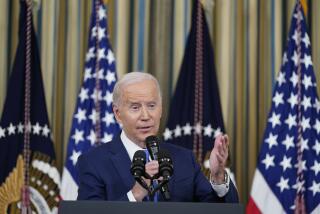Summit No Threat to U.S. Role, Japan Official Says
- Share via
This week’s historic summit between the leaders of Europe and Asia does not pose a threat to the United States’ influential role in that region, according to the newly appointed Japanese ambassador to the U.S., Kunihiko Saito.
The meeting in Bangkok, Thailand, scheduled for Friday and Saturday, brings together for the first time the leaders of the 15 European Union nations and their counterparts from the seven-member Assn. of Southeast Asian Nations, Japan, South Korea and China.
With the winding down of the Cold War, Asia-Pacific countries have begun reevaluating their economic and strategic alliances. Some people fear the U.S. government is losing its influential role in that region because of the shift from security issues to economics and the pressure to grapple with domestic concerns.
But in an interview Tuesday in Los Angeles, Saito said the European-Asian summit simply reflects a desire to jump-start a political and economic relationship that has historically lagged behind that of the United States with Japan or the United States with Europe.
“These developments in European-Asian relations should be welcomed by the United States,” he said.
Saito, who assumed his Washington post in December, said the European and Asian nations recognize that the U.S.-Japan alliance is still a major contributor to regional stability, particularly given the current tensions on the Korean peninsula and across the Taiwan Strait.
The Europeans hope their efforts to forge their own economic relations with Asia will deflect criticisms that they have enjoyed the benefits of U.S. trade liberalization efforts without doing the work of negotiating with Asian countries, especially Japan.
Saito, whose lengthy resume includes a post as counselor for the Permanent Mission of Japan to the European Community, said Japan and other Asian nations hope the Bangkok summit will result in expanded trade between the two regions. One issue on the table is the elimination of barriers that have hindered European trade and investment in Asia.
Asian companies also complain about being frozen out of the European market, particularly in the agriculture sector.
Countries such as England and France may command less prominence in the world economy, but they remain “politically influential” and play an important role in organizations such as the United Nations, the Japanese diplomat explained.
More to Read
Sign up for Essential California
The most important California stories and recommendations in your inbox every morning.
You may occasionally receive promotional content from the Los Angeles Times.












